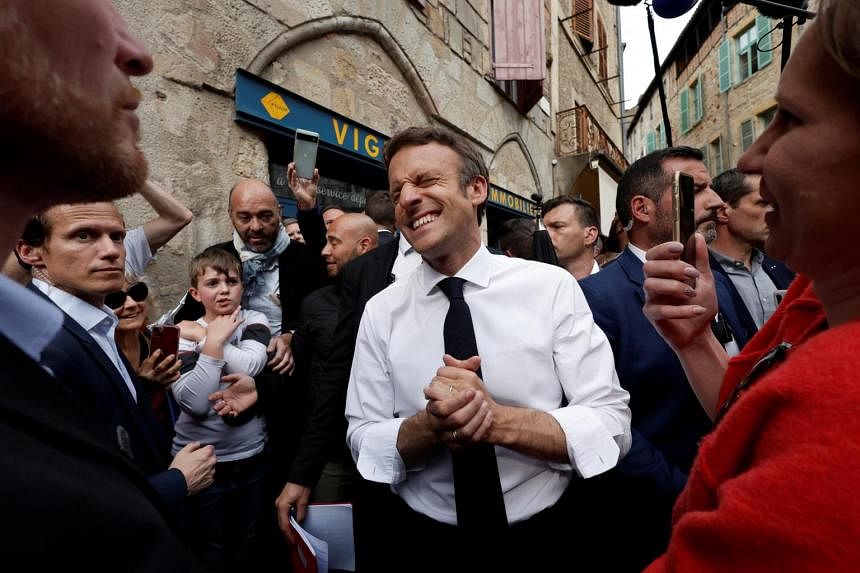LONDON - French President Emmanuel Macron looks set to win another term in office as voters go to the polls on Sunday (April 24) in the second and decisive round of the country's election.
The latest opinion polls published on Friday before a legal ban on any further polling came into force indicate that Mr Macron enjoys a lead of anything between 10 to 12 percentage points ahead of Ms Marine Le Pen, his far-right opponent.
But even if Mr Macron's victory is confirmed, the battle for France is only beginning, since the country is scheduled to hold parliamentary elections in June, and these may well limit the President's ability to implement his vision.
Under France's two-round electoral system for the presidency, if a candidate attracts over half of all the votes cast, he or she gets elected outright. But since that has never happened, a second ballot is held two weeks later, at which only the two best-placed candidates from the first round can compete.
Mr Macron did well in the first round of voting: he got 27.8 per cent of the vote, better than the previous 24 per cent he scored in 2017.
Ms Le Pen, who was his chief opponent in 2017 also did well, but not as well as she had hoped: She got 23.1 per cent of the vote this time, or only 1.8 percentage points more than in 2017. Over the past two weeks of crucial campaigning, she has slid further behind in the popularity stakes.
In theory, a surprise win for Ms Le Pen is still possible because even though most of the candidates eliminated in the first round have pledged their votes to Mr Macron, the electorate does not need to follow anyone's recommendation.
Furthermore, since voting is not compulsory, a high abstention rate may well hurt him, if only because Ms Le Pen's electorate is far more committed.
In practice, however, there is no precedent in French political history of a candidate closing a double-digit gap between the first and second electoral rounds, so unless all the French opinion polls are catastrophically wrong, Mr Macron must be regarded as an almost certain winner.
But the president is facing much bigger and more enduring problems.
The first one is that he will win not so much because people actually like him, but because they dislike his opponent more. Mr Macron is almost universally viewed as arrogant and elitist.
His far-right opponent is regarded as both more approachable, and more in tune with an electorate disenchanted with a steep rise in the cost of living and a variety of other economic ills.
Ms Le Pen is a particular hit with younger voters; her main liabilities are her extreme anti-immigrant and anti-Muslim views, as well as the links between her party and Russian President Vladimir Putin, not exactly a vote-winning proposition in Europe today.
Thus, although President Macron is likely to win on Sunday, he is neither liked nor much respected.
To make matters worse, Mr Macron has failed to consolidate his political party as a durable force in French politics.
In the first round of the presidential election, more than half of French voters supported candidates of either the extreme left or the extreme right. Both extremes lost but they may do much better in the parliamentary elections scheduled for June.
Mr Macron's own party, awkwardly entitled "The Republic Marching", claims to be centrist. Yet, in reality, it is just a collection of individuals with little political experience, handpicked by Mr Macron in 2017 and elected on the president's coat-tails.
Given his low popularity ratings - as opposed to his predicted electoral score on Sunday - it is very likely that Mr Macron's party will suffer serious losses in the forthcoming parliamentary ballot.
Ms Le Pen's National Rally may well be the beneficiary in June.
But all eyes are on Jean-Luc Melenchon, a far-left politician running a movement called France Unbowed, that advocates policies such as the imposition of a 100 per cent tax on rich people or the abolition of the right to private property.

Mr Melenchon defied predictions by coming third in the first round of the presidential election, with almost 22 per cent of the votes cast. He now plans to capitalise on his success by winning a majority of the parliamentary seats.
A French president enjoys huge executive powers. But that is more by practice rather than law; a president who has to contend with a prime minister belonging to an opposition party is a recipe for political gridlock in the country.
A far-left politician such as Mr Melenchon could well torpedo whatever economic reform plans the president is contemplating.
So, although Mr Macron may well celebrate his re-election on Sunday evening, he knows that his next five years in the Elysée Palace are not likely to be fun.


